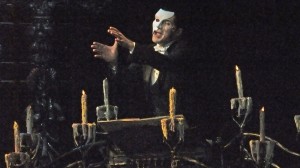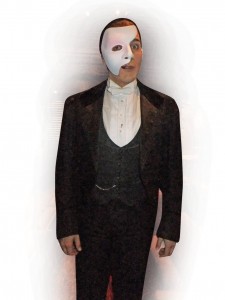The Phantom sneaks into his new lair

SOUTH African stage and television actor Jonathan Roxmouth during a performance at the Teatrino in Johannesburg. “This role makes you see how much anger you still have in you,” he says.
True to form, The Phantom sneaked into his new lair in Manila when he was least bound to be noticed—Tuesday last week, while a bizarre nonstorm challenged established parameters of possibility and danger.
He lost no time in inhabiting the Cultural Center of the Philippines, chucking makeup and mask for the time being, and led rehearsals for his dreaded/beloved music of the night straightaway.
Less than two weeks from now, the enduring Andrew Lloyd Webber musical, “The Phantom of the Opera,” which is being staged in the country for the first time, will have transformed the CCP into 19th-century Paris and presented Filipino theater enthusiasts with a new heartthrob.
South African stage and television actor Jonathan Roxmouth is compelling as Phantom, if reticent as himself. He is tall, good-looking, talented. And young. At 25, Roxmouth has played some of the choicest male roles in musical theater, among them W.A. Mozart in “Rock Me, Amadeus,” Munkustrap in “Cats,” Buddy Holly in “The Buddy Holly Story” and Danny Zuko and Vince Fontaine in “Grease.”
This is not his first time in Asia, by the way. He’s been to Hong Kong as Danny Zuko and, if this one counts, played Lun Tha in “The King and I.”
Article continues after this advertisementBut The Phantom is the role, he told the Inquirer one afternoon last April, adding that, from here on in, that goes straight to the top of his resume. “I don’t think any role can rival
Article continues after this advertisementThe Phantom,” he said, just for starters. “This is beyond anything I’ve done, as well it should be.”
Imperious, maniacal
We had seen him onstage the night before at the famed Teatrino in Johannesburg and, for this interview he turned up in costume, thankfully not in character, as the imperious, maniacal and tormented genius.
To emphasize a point just minutes into the conversation, the actor started singing, forcefully, “Christine, I love you.” And then softly, “Christine, I love you.” (The interviewer was tantalized, but snapped back in the nick of time to a rude awakening: Her name was not Christine.)
Crazed as The Phantom had been, he had to handle his prey with kid gloves, the actor said, thus the “tremulous and tender” notes required in the seduction scenes. He explained further: “In the book it is said that he had the voice of an angel. I myself wouldn’t call anyone who shouts at me an angel. And if Christine is the only one who can hear him, he can’t be loud, he won’t be loud… he will be a lot more enticing [than frightening]. As much as this is a melodrama, you can’t take the situation too far out of reality. Audiences will pick up right away that it’s phony.”
Softly is how Roxmouth seduces audiences as well. The blustering high notes of the title song certainly requires attentiveness, but it is “Music of the Night” that makes the quintessential antihero utterly sympathetic, nearly lovable. (The scene has moved spectators around the world to thunderous spontaneous applause.)
“The book” is the 1911 novel “Le Fantome de Opera” by Gaston Leroux (1868-1927). The author has been quoted as saying that he was inspired, after visiting the Paris Opera House, to write the story of a disfigured genius masterminding the career of his beautiful protégé. Roaming the building’s lower depths, Leroux said, he found a mysterious subterranean lake (where he eventually envisioned the phantom’s lair to be). He also said he was reminded of an accident in the theater in 1896, when one of the counterweights of a huge chandelier had crashed on the audience.
Silent movie
The story of “Fantome” was presented to the public in 1925 as a silent movie starring Lon Chaney, Hollywood’s “Man of a Thousand Faces.”
He read the book, Roxmouth said, but did not see the movie, or the other movie versions that followed—the latest one in 2004 made by Joel Schumacher and starring Gerard Butler, Emily Rossum and Patrick Wilson.
As for stage Phantoms, Roxmouth would only discuss Michael Crawford, the English actor who originated the role in 1986. Deliberately, he deviates from Crawford’s acting style. “Audiences would know if I’m trying to be someone else,” he said. But he emulates the elder actor’s singing. “He uses these long phrases… I try to do that. For me Michael Crawford is, and always will be, incomparable.”
Concert pianist
If Roxmouth sits so confidently and credibly at The Phantom’s keyboards, that’s because, away from the theater and TV studios, he is a concert pianist. More importantly, he knows very well what it’s like to be a recluse who summons music to deal with pain.
“In high school I wasn’t a very popular kid,” he confessed. “I would spend all my spare time in the auditorium alone, playing the piano. So the idea of this man at his organ, in the darkness, really spoke to me.”
It’s been “a very Andrew Lloyd Webber year for me and I’m not complaining,” he said.
Before “Phantom” he had just finished a run of “Jesus Christ Superstar,” also in Teatrino, as Judas. “Coming to this role (Phantom) was just a natural progression, I think, in that, both men spent a lot of time in the dark just watching.”
Intense? Absolutely. This is why it takes a while to wrap the mind around one of Roxmouth’s acting achievements to date, a Naledi (premier theater awards in South Africa) trophy for best comedy perfomance as the hunter in “Beauty and the Beast” (2008).
“That is a funny role,” he said laughing. “But comedy is hard.” Drama, like “Phantom,” comes more naturally for him, he insisted. “Well, comedians are usually very sad people. Drama is easy. However when you have something like this, very complex and multilayered and requires so much, I have to be ready to… not sacrifice, but just let it all happen.”
Let it happen he did, because “it’s important, I believe, that I do all those things that are right for me.”
“Phantom” is right on many levels, Roxmouth said. “It’s my dream role, in my dream show. I was brought up on this music, and the story resonates with my personal life. It reminds me very much of my family, my late grandfather.” He did not explain this last one, but added: “I keep telling everybody that I’ve learned a lot more about myself doing this than any other role—because it makes you realize how much pain you might still have in you. Every night is just like going to therapy for me. I let it all out… and as some people may see, by the end of the show, I’m a mess.”
(“The Phantom of the Opera,” from the Really Useful Company Asia Pacific, premieres Aug. 25 and runs until Sept. 30 at the CCP Main Theater.)
